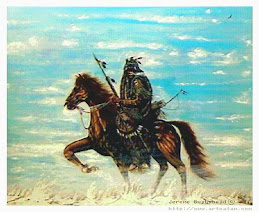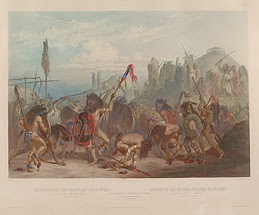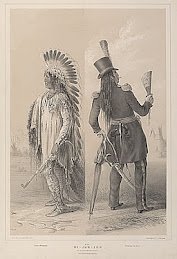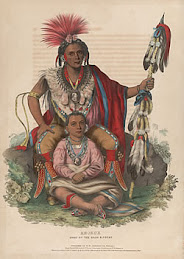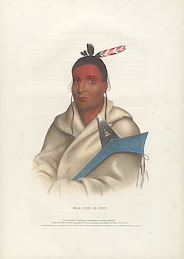Friday, May 29, 2009
Excerpt #2
"Junior Polatkin stole a rifle from the gun rack in Simon's pickup. Junior didn't know anything about caliber, but he knew the rifle was loaded because Simon had told him so. Junior strapped that rifle over his shoulder and climbed up the water tower that had been empty for most of his life. He looked down at his reservation, at the tops of HUD houses and the Trading Post. A crowd gathered below him and circled the base of the tower. He could hear the distant sirens of the Tribal Police cars and was amazed the cops were already on their way.
Junior unshouldered the rifle. He felt the smooth, cool wood of the stock, set the butt of the rifle against the metal grating of the floor, and placed his forehead against the mouth of the barrel...He flipped the safety off, held his thumb against the trigger, and felt the slight tension. Junior squeezed the trigger."
Alexie, Sherman. Reservation Blues. New York: Grove Press, 1995.
p. 247
Junior unshouldered the rifle. He felt the smooth, cool wood of the stock, set the butt of the rifle against the metal grating of the floor, and placed his forehead against the mouth of the barrel...He flipped the safety off, held his thumb against the trigger, and felt the slight tension. Junior squeezed the trigger."
Alexie, Sherman. Reservation Blues. New York: Grove Press, 1995.
p. 247
Thursday, May 14, 2009
List of References
Literature:
- Reservation Blues by Sherman Alexie
- Indian Killer by Sherman Alexie
- Ten Little Indians by Sherman Alexie
- The Lone Ranger and Tonto Fistfight in Heaven by Sherman Alexie
- Ceremony by Leslie Marmon Silko
Television:
- We Shall Remain
Movies:
- Bury My Heart at Wounded Knee
- Apocalypto
- Dances with Wolves
- The New World
- Smoke Signals
Actors:
- Nathan Lee Chasing His Horse (Dances with Wolves, Smiles A Lot)
- Q'Orianka Kilcher (The New World, Pocahontas,)
- Raoul Trujillo (Apocalypto, Zero Wolf; The New World, Tomocomo)
- Rudy Youngblood (Apocalypto, Jaguar Paw)
- Adam Beach (Law & Order: Special Victims Unit, Chester Lake; Bury My Heart at Wounded Knee, Dr. Charles Eastman (Ohiyesa))
Music:
- Small World by Robert Johnson
- Urban Indian Blues by Robert Johnson
- Big Mom by Robert Johnson
- Falling Down and Falling Apart by Robert Johnson
- My God Has Dark Skin by Robert Johnson
- Indian Boy Love Song by Robert Johnson
- Treaties by Robert Johnson
- Reservation Blues by Robert Johnson
Native American Artists
Dana Tiger
http://www.artnatam.com/dtiger/index.html
Jerome Bushyhead
http://www.artnatam.com/bhead/index.html
http://www.artnatam.com/dtiger/index.html
Jerome Bushyhead
http://www.artnatam.com/bhead/index.html
Websites/Links
http://www.religioustolerance.org/nataspir.htm
- This website discusses religious tolerance, as the URL states, and describes Native American religious beliefs and practices, as well as European and Canadian treatment of Native Americans. I suggest this website to be read; it is very informative and eye-opening.
- Check out the FAQ
- "The arrival of Europeans marked a major change in Native society. Millions died due to sickness, and programs of slavery and extermination. 1 Europeans and their missionaries looked upon Native Spirituality as worthless superstition inspired by the Christian devil, Satan. Many of the survivors were forcibly converted to Christianity. The U.S. and Canadian governments instituted policies to force Natives onto reservations and to encourage them to become assimilated into the majority culture. 2 During the middle decades of the 20th century, whole generations of children were kidnapped, forcibly confined in residential schools, and abused physically, sexually and emotionally. In Canada, these schools were operated on behalf of the Federal Government by the Roman Catholic, Anglican, United and Presbyterian churches. Both the government and these religious institutions have settled a multi-billion dollar class-action lawsuit. Claims against the Anglican Church were much greater than the Church's current assets. The was a concern for a while that the church might be forced into bankruptcy due to legal costs.
Native spirituality was suppressed by the U.S. and Canadian governments. Spiritual leaders ran the risk of jail sentences of up to 30 years for simply practicing their rituals. This came to an end in the U.S. in 1978 when the Freedom of Religion Act was passed.
Some suicidologists believe that the extremely high suicide rate among Natives is due to the destruction of their religion and culture by the Federal Governments. This suppression is still seen in the prison administrations; Canadian prisons have only recently allowed Native sweat lodge ceremonies; many American prisons routinely deny permission."
http://www.ipsl.org/programs/summer/southdakota.aspx
- Summer Service-Learning Program in the Lakota Nation, South Dakota
- Study Abroad integrated with Volunteer Service
http://www.sacred-texts.com/nam/index.htm
- This website discusses the lack of "authoritative information" on Native American religious/spiritual practices. A list of literary references is included, as well as entire books concerning Native Americans.
http://www.americanchronicle.com/articles/view/102102
- Native American Women Are Missing Out On Mammograms
- "...many Native American women are not being given regular diagnostic exams that include mammograms."
http://www.native-languages.org/kids.htm
- Very informative, as well as interesting.
- "The best-known episode in Cherokee history was also the worst: the Trail of Tears, the forced relocation of the Cherokee Indians from their ancestral home in the southeast to Oklahoma. The Cherokee people were an urban, Christian, agricultural, intermarried society who had supported the United States against other tribes. In the end this was all for nothing. Though prominent Americans like Davy Crockett and Daniel Webster spoke against Removal, and though the Supreme Court ruled it unconstitutional, President Andrew Jackson sent in the army. Fifteen to twenty thousand Cherokee Indians (along with Choctaw, Creek, and other tribes) were rounded up and herded to Oklahoma in the winter of 1838-1839. Driven from their homes without being allowed to collect their possessions first, even their shoes, the Cherokees were no better equipped for an 800-mile forced march than people today would be. Between four and eight thousand Cherokee people died of exposure, starvation, disease, and exhaustion along the Trail of Tears. If you understand this, both the extent to which the Cherokees had adopted American standards of civilization before the Removal and the ultimate futility of it, you will go a long way towards understanding the Cherokee mentality and also the attitudes of other Indian peoples towards us. "
http://www.lib.washington.edu/subject/history/tm/native.html#major
- Includes lists of websites which describe the history of Native Americans, as well as references for texts and images.
http://etext.virginia.edu/subjects/Native-American.html
- Lists of electronic texts
http://etext.lib.virginia.edu/toc/modeng/public/AleAmer.html
- Includes various poems concerning Native Americans
- Click on the link "Poem."
http://bancroft.berkeley.edu/Exhibits/nativeamericans/
- Native American images
http://edtech.kennesaw.edu/web/natam.html
- Research/informational sites
- Native American artists' home page
*more to be added soon
Books, courtesy of: religioustolerance.org
- Ward Churchill, "A Little Matter of Genocide: Holocaust and Denial in the Americas, 1492 to the Present," City Lights Books, (1998). Read reviews and/or order this book safely from Amazon.com's online bookstore
- Ward Churchill et. al., "Agents of Repression: the FBI's Secret Wars Against the Black Panther Party and the American Indian Movement." South End Press, (1988). Read reviews and/or order this book
- Vine Deloria, "Red Earth, White Lies: Native Americans and the Myth of Scientific Fact," Fulcrum Pub (1997). Read reviews and/or order this book
- T.D. Dillehay, "Monte Verde: A late Pleistocene settlement in Chile: The archeological context and interpretation," Smithsonian Institution Press, (1997). Read reviews or order this book. This is not an inexpensive book!
- Arlene B. Hirschfelder & Paulette Molin, "The Encyclopedia of Native American Religions: An Introduction," Facts on File, (1992). Read reviews or order this book
- Ake Hultkrantz & Monica Setterwall, "The Religions of the American Indians," University of California Press, (1981). Read reviews or order this book
- Lee Irwin, "Native American Spirituality: A critical reader," University of Nebraska Press, (2000). Read reviews and/or order this book
- Lawrence Sullivan, "Native Religions and Cultures of North America," Continuum International Publishing Group, (2003). Read reviews and/or order this book
- Dennis Tedlock & Barbara Tedlock, "Teachings from the American Earth: Indian Religion and Philosophy," Liveright Publishing Corporation, (1992). Read reviews and/or order this book.
Quotes, courtesy of: religioustolerance.org
"The culture, values and traditions of native people amount to more than crafts and carvings. Their respect for the wisdom of their elders, their concept of family responsibilities extending beyond the nuclear family to embrace a whole village, their respect for the environment, their willingness to share - all of these values persist within their own culture even though they have been under unremitting pressure to abandon them."
-Mr. Justice Thomas Berger, Mackenzie Valley Pipeline Inquiry, (aka the Berger Inquiry), Canada.
"Rather than going to church, I attend a sweat lodge; rather than accepting bread and toast [sic] from the Holy Priest, I smoke a ceremonial pipe to come into Communion with the Great Spirit; and rather than kneeling with my hands placed together in prayer, I let sweet grass be feathered over my entire being for spiritual cleansing and allow the smoke to carry my prayers into the heavens. I am a Mi'kmaq, and this is how we pray."
-Noah Augustine, from his article "Grandfather was a knowing Christian," Toronto Star, Toronto ON Canada, 2000-AUG-09.
"If you take [a copy of] the Christian Bible and put it out in the wind and the rain, soon the paper on which the words are printed will disintegrate and the words will be gone. Our bible IS the wind."
-Anonymous Native American woman
-Mr. Justice Thomas Berger, Mackenzie Valley Pipeline Inquiry, (aka the Berger Inquiry), Canada.
"Rather than going to church, I attend a sweat lodge; rather than accepting bread and toast [sic] from the Holy Priest, I smoke a ceremonial pipe to come into Communion with the Great Spirit; and rather than kneeling with my hands placed together in prayer, I let sweet grass be feathered over my entire being for spiritual cleansing and allow the smoke to carry my prayers into the heavens. I am a Mi'kmaq, and this is how we pray."
-Noah Augustine, from his article "Grandfather was a knowing Christian," Toronto Star, Toronto ON Canada, 2000-AUG-09.
"If you take [a copy of] the Christian Bible and put it out in the wind and the rain, soon the paper on which the words are printed will disintegrate and the words will be gone. Our bible IS the wind."
-Anonymous Native American woman
Subscribe to:
Posts (Atom)
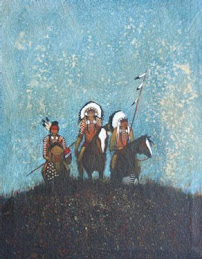
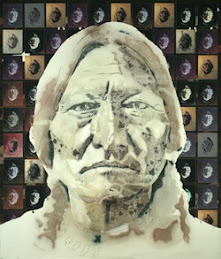
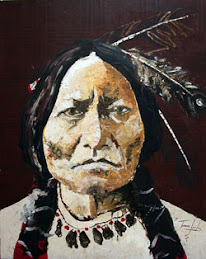
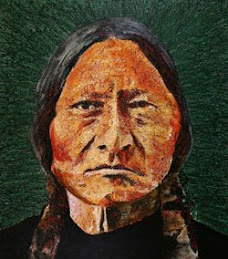

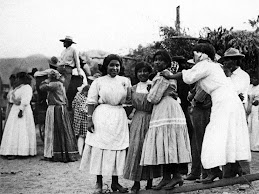



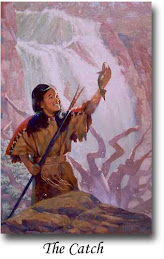

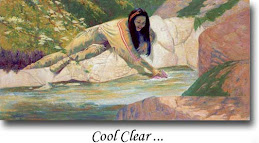

,+Peggy+O%27Neal.jpg)
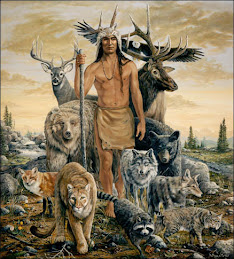,+Peggy+O%27Neal.jpg)
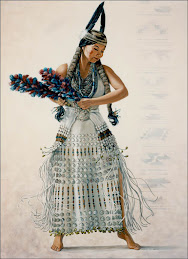,+Peggy+O%27Neal.jpg)
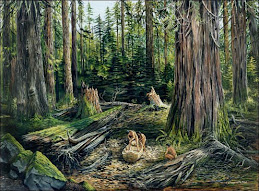,+Peggy+O%27Neal.jpg)
